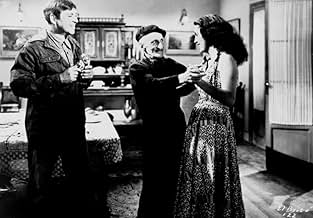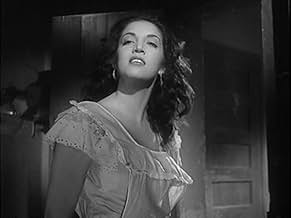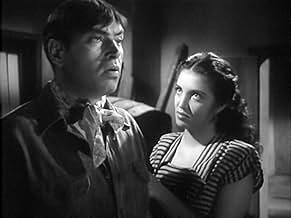Adicionar um enredo no seu idiomaA tough young man who helps to evict poor people from their houses falls in love with a girl who lives with her father in a building that's about to be demolished.A tough young man who helps to evict poor people from their houses falls in love with a girl who lives with her father in a building that's about to be demolished.A tough young man who helps to evict poor people from their houses falls in love with a girl who lives with her father in a building that's about to be demolished.
- Direção
- Roteiristas
- Artistas
- Prêmios
- 1 vitória e 2 indicações no total
- Meche
- (as Rosa Arenas)
- El Cojo - Tío de María
- (as G. Bravo Sosa)
- Vecina
- (não creditado)
Avaliações em destaque
Pedro Armendariz uses his enormous star power to give an unforgettable performance as the brute, a 'slow thinker' as he calls himself--he's a Victor McLaglen type only a lot sexier. Katy Jurado, the female equivalent of Armendariz in popularity, is wonderfully mendacious here. And Andres Soler as the grasping landlord reminds me so much of Walter Huston; they could have been brothers. Enjoyable to watch, because of the performances, just don't expect the usual Bunuel touches.
Pedro goes to the community in the night and he hits the weak Carmelo that has a bleed and dies. When Pedro meets Carmelo's daughter Meche (Rosa Arenas), he falls in love with her and she moves to his house. But the jealous Paloma does not want to give up on Pedro. "El Bruto" is a melodramatic film by Luis Buñuel with the background of a fight of classes between an abusive and powerful landlord and his poor tenants. In this film, Buñuel does not use his "trademark" – the surrealism – and the story is very simple but engaging. The screenplay is very well written and the direction and performances are top-notch. My vote is seven.
Title (Brazil): "O Bruto" ("The Brute")
*** (out of 4)
A slumlord (Andres Soler) tries to evict some tenants from one of his rundown apartments but they refuse to go so he asks a strong but dumb Bruto (Pedro Armenariz) to scare them. Bruto goes to the man causing the most trouble not knowing that he is ill. After a strong punch the man dies and soon Bruto falls in love with a woman (Rosa Arenas) not realizing that it's the dead man's daughter. I was a little worried going into this film after reading some negative reviews but it turned out to be pretty good and didn't just focus or preach about how the poor are treated. As the film started I was thinking this was just going to be a morality tale but Bunuel takes the film into many different directions and really delivers a terrific character study for not only Bruto but the slumlord as well. I really enjoyed the way that Bunuel didn't just show both men as evil but showed that they both had good qualities below all the bad things that they do. The relationship with Paloma (Katy Jurado), the slumlord's much younger wife, gives us plenty of insight to the two men and especially with Bruto and his dumbness. I also loved the style that Bunuel brought to the film in terms of shadows, which is perfectly used during one scene where a group of men are chasing Bruto to kill him. What really keeps this film going are the terrific performances by the entire cast. Armenariz does a brilliant job at being the brute but his performance is made even better by the fact that he can pull off the character's weaker moments. Arenas is downright beautiful and very touching in her role and I really couldn't take my eyes off of Soler who really steals the film with his snake like qualities. This here certainly doesn't rank among the director's greatest works but I think it's still a very entertaining film with a lot going for it.
As I said, the plot is simple: wealthy but ageing businessman Andres Soler wants to sell a property currently leased to numerous poor families; he presents them with an eviction notice but, through the instigation of a few headstrong tenants, they unanimously refuse to vacate the premises and almost assault their landlord for what they consider his inhumanity and greediness! Arriving home with his pride broken, he does not elicit sympathy from his much younger and determined wife (an altogether startling turn by Jurado, who walked off with a Silver Ariel award for Best Supporting Actress!) but she instantly suggests, metaphorically, that he simply get rid of the opposition and, to this end, Soler hires a brawny but slow-witted slaughterhouse worker nicknamed "Bruto" (Armendariz).
The latter's first attempt at intimidation, even if he had even hardly touched the man, results in tragedy (due to the victim's weak physical condition); for this reason, Soler shelters him in his own house, where the boss' hilariously doddering and cantankerous, yet mischievous, father (played by 81-year old Paco Martinez) also resides; the elderly man's shtick – his uniquely doddering walk on the way to procure himself some candy behind his son's back, his constant muttering of the would-be swear word "Pugnales" and even licking tequila off of his daughter-in-law's little finger – is a source of much amusement throughout the film. Bruto's defection to the Soler household liberates him from the oppression in his own home which he shares with his live-in girlfriend and her family of 'leeches': a bed-ridden, perennially expiring but chain-smoking would-be-mother-in-law; her own lame brother who badmouths her at every turn; her ingrate and unemployed son who only visits to fleece the relief money, etc.! Before long, Jurado turns her attentions to Bruto – who is unable to resist her; in fact, the sexual tension the film displays in their clandestine encounters must have been an eye-opener for its time (certainly when compared with the Hollywoodian standard).
Further plot complications arise when the residents try to teach Armendariz a lesson and, injured by a nail driven through his shoulder(!), he stumbles into the hovel where the daughter (called Meche, just like the milk-bathing girl in Bunuel's LOS OLVIDADOS [1950]) of his own earlier victim has been living; she unselfishly looks after him, and he finds himself falling for the girl (a young Rosita Arenas, later star of such classic Mexi-Horror titles as THE WITCH'S CURSE [1960] and THE CURSE OF THE CRYING WOMAN [1961]). This turn-of-events – which anticipates Marlon Brando's fate in Elia Kazan's Oscar-laden classic ON THE WATERFRONT (1954) – obviously jeopardizes Bruto's relationship with Jurado and, after she confronts the younger woman and Armendariz gives the boss' wife a piece of his mind in the only way he knows how, the rejected mistress informs her clueless husband that Bruto had raped her!
All of which leads first to a tete-a'-tete between the landlord and his thug, which leaves the former with a broken back and his face smashed in (again, it was unusual to depict violence in such an unflinching manner back then) and, eventually, Bruto's own demise in a hail of bullets when he is cornered by the Police (led to him by Jurado herself); curiously enough, there are some who hold the view that THE BRUTE is Bunuel's retelling of the Frankenstein tale in a modernized socio-political key but, frankly, it did not strike me that way – after all, the creator did not intend his creature to do his evil bidding! Anyhow, Arenas had grown fond of Armendariz in spite of herself and she lies by his side as he expires but, tellingly, the film's last shot sticks with his other jilted lover – Jurado now left all alone and probably gone off her rocker Tennessee Williams-style as she glares defiantly at a rooster believing it is making fun of her!
Você sabia?
- CuriosidadesDuring filming, actor Pedro Armendáriz strenuously refused to wear short-sleeved shirts, claiming they were made for pedophiles.
- Citações
Pedro - El Bruto: You have such ways with me. It's true.
Paloma: Come and look. Here are your clothes, clean and mended. Fix yourself up a little. You always look so sloppy and your hair is always messy. And you show off with an open shirt.
Pedro - El Bruto: That's not true. I lost a button.
Paloma: I'll fix it. It's incredible. Such manliness and yet you're such a baby. You don't seem to be a real man. When Don Andrés scolds you,u you look for a back to hide behind. I could did laughing.
Pedro - El Bruto: Don't say that, ma'am. I love and respect him because he has known me since I was a baby. My mother was Don Pepe's maid. The old man. He was always good to us. He sent me to school, and would hit me if I did something wrong. But when he was in a good mood he gave me candy and allowed to listen to his clock. Somebody once said he was my father. I had a fight over it with some other kids. If he was my father... I'm sure he'd tell me. Don't you think?
Paloma: [El Bruto forces himself upon Paloma] Leave me alone. Let me go.
Pedro - El Bruto: I'll teach you to stop playing with me.
Paloma: You want me to call Andrés? You bastard! What did you think? That I'd allow you to touch me with your dirty hands?
Pedro - El Bruto: Forgive me. I thought that...
Paloma: What, idiot?
Pedro - El Bruto: That you liked me.
Paloma: But you forget something very important. That I have to be willing also.
Principais escolhas
- How long is The Brute?Fornecido pela Alexa
Detalhes
- Tempo de duração1 hora 21 minutos
- Cor
- Proporção
- 1.37 : 1
Contribua para esta página
























